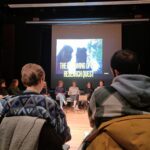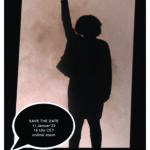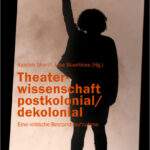
Reflections on panel discussion at the University of Amsterdam
Towards a Post/Decolonial Theatre Studies? About life-long learning processes and rethinking the way we act“ By Sarnia van Capelleveen, Hidde Stobbe, Tai-Jung Yu
New Critical Theatre Studies
intersectionality
Activism
Anti-racism.
Network for intersectional, decolonial and postcolonial theories, methods, and issues in theatre and performance studies
About the Network
We, the New Critical Theatre Studiesare a group of German-speaking theatre and performance researchers based in different parts of Europe. We built this network with the aim to draw attention to the lack of postcolonial, decolonial, and critical race theory in German-speaking theatre and performance studies. This lack manifests in the field’s ignorance towards harmful legacies of racialized and colonial practices and discourses that still influence and are perpetuated by theatre-making practices and academic discourse. It also shows itself in the ongoing exclusion and marginalisation of racialised artists and their creative practices in German-speaking countries.
This is why we built this network as a tool of intervention: The Neue Kritische Theaterwissenschaft offers a platform for theatre researchers working with postcolonial, decolonial, and critical race theories to exchange ideas, to work and publish collaboratively, and to organise themselves in what is still understood to be a ‘niche’ and exists in the periphery. It offers tools and tutorials for a next generation of students on intersectional approaches and postcolonial and decolonial theories for the field of theatre and performance studies. Tools that until now are rarely taught in the German-speaking university classrooms but, as we know from our own teaching experiences, are in high demand in the current generation of theatre studies students. On our blog, we offer space and resources for students to publish or upload interviews with Black German theatre-makers and theatre-makers of Colour and discuss performances that address issues of race and representation, intersectionality, decoloniality that might not otherwise be reviewed by German mainstream media. In particular, we acknowledge the violent and racist structures of white academia and wish to offer our support to BIPOC theatre studies’ students: we encourage you to get in contact with us.
In recent years, there have been efforts to address the lack of diversity and antiracist practices in the German-speaking theatre system. These include attempts at increased representation, bias awareness and anti-racism training, as well as more publicised discourse on the urgent matters of decolonisation and antiracist activism. Unfortunately, the same cannot be said for German-speaking theatre and performance studies. The research outputs and curricula of theatre studies in the German context is largely unaffected by an attention to the systemic nature of racialised discourses or legacies of colonial knowledge production. We believe that the question of decolonising the university the university is inseparably linked to defending the university’s role as a sphere of civic engagement and its responsibility to social and political struggles. We are therefore committed to understanding and practising academic research holistically - in and outside the academy, in and outside cultural spaces, in and outside classrooms of all kinds. Our ethos is anti-racist and feminist, and more broadly: intersectional.
In our endeavours, we stand on the strong shoulders of different thinkers, academics, artists and activists of Colour, whose writings and critical interruptions have inspired the establishment of this network. This is not to obfuscate the many powerful postcolonial, decolonial and critical race works, but to introduce some of the concepts, artistic practices and movements which have personally changed our ‘thinking as usual’ at specific moments in our lives. Therefore, we offer these reflections not as a definitive ‘reading list’ but as personal glimpses into intellectual, activist and creative encounters. It is our belief that attention to intersectional issues and the application of decolonial methodologies and antiracist practices should not be confined to a single discipline in theatre and performance studies. Instead, we aim to develop a methodological framework for the unquestioned inclusion of these issues into all forms of theatre and performance research, may it be theatre historiography, contemporary performance analyses or the production of theory. Our focus on the field of German-speaking theatre and performance studies is not exclusive to other regional theatre discourse. On the contrary, we know that similar gaps in theatre research can also be detected in Dutch, Belgian, Polish or Danish theatre studies. Rather than focusing on geographic and nation-state frameworks, we are committed to finding new epistemological approaches and inciting epistemic changes at large.
news

Towards a Post/Decolonial Theatre Studies? About life-long learning processes and rethinking the way we act“ By Sarnia van Capelleveen, Hidde Stobbe, Tai-Jung Yu

Hiermit möchten wir Euch herzlich zum Online Panel Theaterwissenschaft postkolonial/ dekolonial am 11. Januar 2023 um 19 Uhr CET einladen.

Anika Marschall and Ann-Christine Simke's article "Forensic Architecture in the Theatre and the Gallery: A Reflection on Counterhegemonic Potentials and Pitfalls of Art Institutions"

The edited collection “Theaterwissenschaft postkolonial/dekolonial”, by Azadeh Sharifi and Lisa Skwirblies published with a transcript, is finally out this week. It is also available as open access on the website of the publisher.
About the Team
Anika Marschall (she/her) currently holds a PostDoc position in the Theatre Studies department at the University of Aarhus. She is the co-editor of the Scottish Journal of Performance and her monography Performing Human Rights: Artistic Intervention into European Asylum will be published with Routledge next year.
“Who is my research benefitting and who is it harming today?”, is my daily question tool to evaluate and hold myself, my actions and work accountable. I am a white, cis-female, able-bodied, thirty-year-old, atheist, German, currently working in a fixed-term contract as Postdoc at Aarhus University Denmark among all white, cis, able-bodied Danish colleagues. In this particular situatedness, I owe my continuous self-education and decentering work to BIPOC artists, scholars and activists in the Nordic countries: Aaiún Nin, Awa Kontaé, Bertrand Besigye, Choco Guilène, Deise Faria Nunes, Dina El Kaisy Friemuth, Jasmine Kelekay, Jeanette Ehlers, La Vaughn Belle, Lesley-Ann Brown, Marronage, Mica Oh, Monia Sander Haj-Mohammed, Phyllis Akinyi, Pia Arke, Temi Odumosu, The Union and Yancé-Myah Antonio Harrison, among many others.
Ann-Christine Simke (she/her) is a PostDoc researcher at the Institute for Theatre Studies at the University of Bern, where she teaches and publishes on institutional dramaturgy, critical race studies and performance studies in a global perspective.
I grew up in a small town in the northwest of Germany and was the first one in my family to attend university. While this lack in academic background required some adjustments and sometimes created a feeling of alienation, I am conscious of how I as a white, middle-class, female, cis-gender, able-bodied German researcher am privileged in a system that systemically marginalizes racialized researchers. I have the (questionable) privilege of being able to move between my home in Glasgow and my fixed-term postdoc position in Switzerland, while acknowledging the neoliberal pressures on early career researchers to stay flexible and mobile across borders and the limitations that this requirement often puts on racialized academics or researchers with the “wrong” passport.
Azadeh Sharifi (she/her) currently holds a position as Visiting Assistant Professor (DAAD-Gastprofessur) at the Department of Germanic Languages and Literatures of the University of Toronto. Prior to that she has been Visiting Professor at the University of the Arts in Berlin (UdK).
I am a former refugee who grew up in Germany without citizenship (and therefore without citizen rights) until her eighteenth birthday. I have been racialized, shamed, policed and marginalized by white Germans for as long as I can remember. One of the most traumatizing experiences within academia was when a white, female German theatre scholar attacked me after a conference on race and migration by asking for my passport. She then told me to shut my mouth when it comes to experiences of migration because I have a German passport. I have since then drowned in my dreams in the Mediterranean Sea just to make her validate my lived experience. This is how I feel when I enter academic spaces because I am never safe. My sense of security and my sense of belonging might change since I have moved to Canada. Within German Theatre and Performance Studies, I am currently the only non-white theatre and performance scholar who could reach beyond a PhD. The answer of German society to the lack of scholars of Color is that it is a social issue. The perception is that migrants and refugees, or their descendants, are from lower working classes, therefore, they are as a group (and individual) not able to reach higher education. Germany has never been good at concealing its race and class matters and gatekeeping within the education system begins for marginalized and racialized subjects at a very early age.
Lisa Skwirblies (she/her) currently holds a position as Visiting Assistant Professor at the Theatre Studies Department of the University of Amsterdam as well as a PostDoc position at the Ludwig-Maximilians-University of Munich.
I was born in the countryside of northern Germany, close to the sea, and my ancestors have all been diasporic white German settlers along the shores of the Baltic Sea (Lithuania, Kaliningrad, Denmark) with different degrees of attachment to Germany as an imagined community. This background and the family narratives around this diasporic experience complicated my understanding of national identity, cultural heritage, and belonging early on and informed my deep interest in German history and in its intricate and intimate entanglements with the histories of colonialism, racism, and antisemitism. The ways in which I understand my work as an historian have been strongly shaped by the multiple research trips to Namibia, that I conducted over the past years, were I had the honor to meet the late Herero historian Alexander Kaputu.
Tools and Resources:
How to make meetings awesome for everyone? (resource sheet)
About decolonising theatre practice (resource sheet)
We are delighted that you checked out our website and are interested in joining our network. We are open to anyone - researcher, student, teacher, creative practitioner - who shares our values and is interested in collaborating with us in the field of German-speaking theatre and performances studies.
Whether you are keen to offer your expertise and support to emerging researchers and students, or are interested in exchange and dialogue, or would like to benefit from a supportive community of researchers and teachers interested in topics that also motivate your research and thinking - get in touch!
An important note on the word German-speaking: While we are interested in establishing this network across German-speaking academia, there is no requirement to conduct your research in German to be able or eligible to join us.